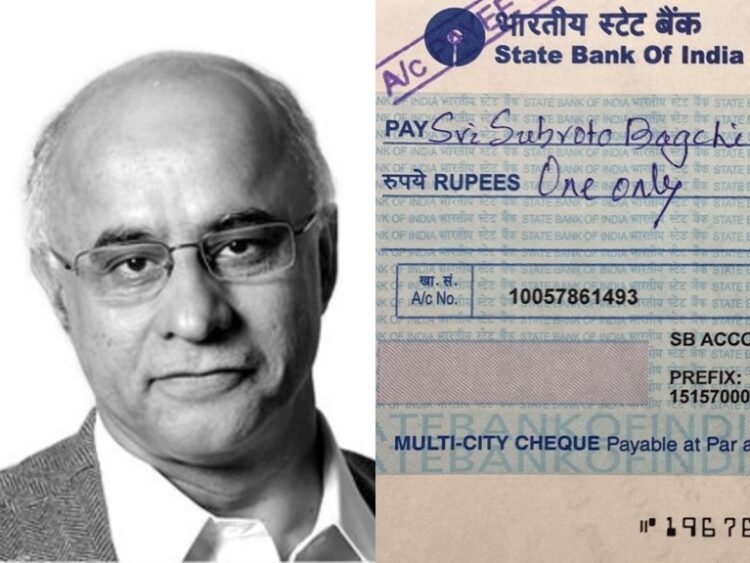As Bagchi looks at that cheque now, he sees not a number, but a story of a life. It’s the memory of a young clerk dreaming of a better future.
In a small, cluttered drawer in Subroto Bagchi’s home lies a treasure he holds dearer than any corporate accolade or bank balance—a faded paper cheque from the State Bank of India, valued at just Re 1. To the world, it’s a trivial sum, barely enough to buy a cup of tea. But to Bagchi, the co-founder of Mindtree, it’s the embodiment of a life well-lived, a symbol of service, and the greatest wealth he’ll ever possess.
Subroto Bagchi’s story begins not in the gleaming boardrooms of Bengaluru’s tech hub, but in the quiet lanes of Odisha, where he was born and raised. As a young man, he started his career as a clerk in the state’s Industries Department, typing letters and filing papers under the hum of ceiling fans. Those early years were modest, but they instilled in him a deep connection to his roots—a love for Odisha and its people that would guide him through decades of extraordinary success.
Fast forward to the late 1990s, and Bagchi, alongside a group of visionaries, co-founded Mindtree, a company that would grow into a global IT powerhouse. His leadership, grounded in empathy and integrity, earned him respect across the industry. With success came wealth, and Bagchi and his wife, Susmita, channeled hundreds of crores into philanthropy, funding cancer care, skill development, and education. Their generosity transformed lives, but for Bagchi, something was missing—a chance to give back directly to the state that shaped him.
In 2012, an opportunity arose. The Government of Odisha invited Bagchi to serve as Chief Advisor for Institution and Capacity Building. It was a role that demanded expertise, time, and dedication, helping to strengthen the state’s institutions and empower its people. Many in his position might have negotiated a hefty salary or sought prestige. Bagchi did neither. Instead, he made an unusual request: a symbolic salary of Re 1 per year. “This isn’t about money,” he told officials. “It’s about coming home.”
For eight years, Bagchi poured his heart into the role. He traveled across Odisha, meeting bureaucrats, educators, and villagers, listening to their dreams and challenges. He worked tirelessly to build systems that would outlast him, fostering governance that was transparent and inclusive. Each year, as promised, the government issued him a cheque for Re 1. He kept them all, not for their monetary value, but for what they represented—a covenant of trust, a commitment to service without expectation.
For the 8 years out there, I got 8 cheques, and this one here was my last salary drawn.

In July 2025, Bagchi shared a photo of his final Re 1 cheque on X, the social media platform. “What is the biggest wealth in this one life that I would never part with?” he wrote. “For the 8 years out there, I got 8 cheques, and this one here was my last salary drawn.” The post wasn’t meant to boast; it was a quiet reflection on a journey that had come full circle. Yet, it struck a chord, spreading like wildfire across the platform.
Comments poured in from strangers and admirers alike. “Your gesture is a lotus in the mud of public virtue,” one user wrote, evoking poetry. Another said, “We need more Subrotos in Odisha—people who succeed and still choose to serve.” A young entrepreneur from Bhubaneswar added, “This is what leadership looks like. Not power, not money, but purpose.” The cheque, worthless in a bank, became a symbol of something far greater—a reminder that true wealth lies in giving without seeking reward.
Bagchi’s story resonates because it’s so human. In an age where success is measured by stock options and social media clout, he chose a path less traveled. He could have spent his later years consulting for global firms or basking titles. Instead, he returned to Odisha, not as a savior, but as a son eager to repay a debt to his homeland. The Re 1 cheque was more than a token; it was a testament to a life anchored in humility.
Bagchi’s wife, Susmita, stood by him through this journey. “We’ve always believed that wealth is what you give away,” she once said. Their philanthropy reflects that ethos, but the Re 1 cheque carries a different weight. It’s a personal artifact, a reminder of long drives through Odisha’s rural heartland, of late-night meetings crafting policies, and of quiet moments when Bagchi felt he was exactly where he was meant to be.
The cheque also harks back to an older idea of public service, one that India has seen in leaders like Gandhi or Sardar Patel, who took symbolic salaries as a matter of principle. In today’s world, where success is often equated with excess, Bagchi’s choice feels radical. He didn’t need to do this. He didn’t need to serve for Re 1 when he could’ve commanded millions. But that’s precisely why it matters—because it was a choice, freely made, rooted in love for his state and its people.
As Bagchi looks at that cheque now, he sees not a number, but a story of a life. It’s the memory of a young clerk dreaming of a better future. It’s the pride of building Mindtree from scratch. It’s the joy of giving back to Odisha, not with fanfare, but with steady, selfless work. “This is my treasure,” he says softly, holding the cheque to the light. “It’s the price of a purpose worth living for.”
In a world obsessed with wealth, Subroto Bagchi’s Re 1 cheque is a quiet rebellion—a reminder that the richest life is one spent in service to others. It’s a story not of crores, but of heart, and it’s one that will inspire generations to come.
(India CSR)







